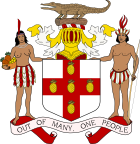 |
|---|
|
|
Politics in Jamaica takes place in the framework of a representative parliamentary democratic constitutional monarchy. The 1962 Constitution of Jamaica established a parliamentary system whose political and legal traditions closely follow those of the United Kingdom. As the head of state, King Charles III - on the advice of the Prime Minister of Jamaica - appoints a governor-general as his representative in Jamaica. The governor-general has a largely ceremonial role,[1] with their parliamentary function consisting simply of granting royal assent to bills which have passed Parliament.[2] Jamaica constitutes an independent Commonwealth realm.[3]
The Constitution vests executive power in the Cabinet, led by the Prime Minister. Executive power is exercised by the government. Legislative power is vested both in the government and in the Parliament of Jamaica. The Prime Minister is appointed by the governor-general, the common convention being the leader of the largest party in Parliament.[4]
A bipartisan joint committee of the Jamaican legislature drafted Jamaica's current Constitution in 1962. That Constitution came into force with the Jamaica Independence Act, 1962 of the Parliament of the United Kingdom, which gave Jamaica political independence. Constitutional safeguards include freedom of speech, freedom of the press, freedom of worship, freedom of movement, and freedom of association.
The judiciary operates independently of the executive and the legislature, with jurisprudence based on English common law.
The Economist rated Jamaica a 'flawed democracy' in 2023.[5]
- ^ "Jamaica - Politics, Economy, Society | Britannica". www.britannica.com. Retrieved 2024-03-13.
- ^ "The Legislature – Jamaica Information Service". jis.gov.jm. Retrieved 2024-03-13.
- ^ "Jamaica", The World Factbook, Central Intelligence Agency, 2024-02-26, retrieved 2024-03-13
- ^ "Overview of the Government of Jamaica – Jamaica Information Service". jis.gov.jm. Retrieved 2024-03-13.
- ^ "Democracy Index 2023: Age of conflict" (PDF). Economist Intelligence Unit. 2024. p. 44.